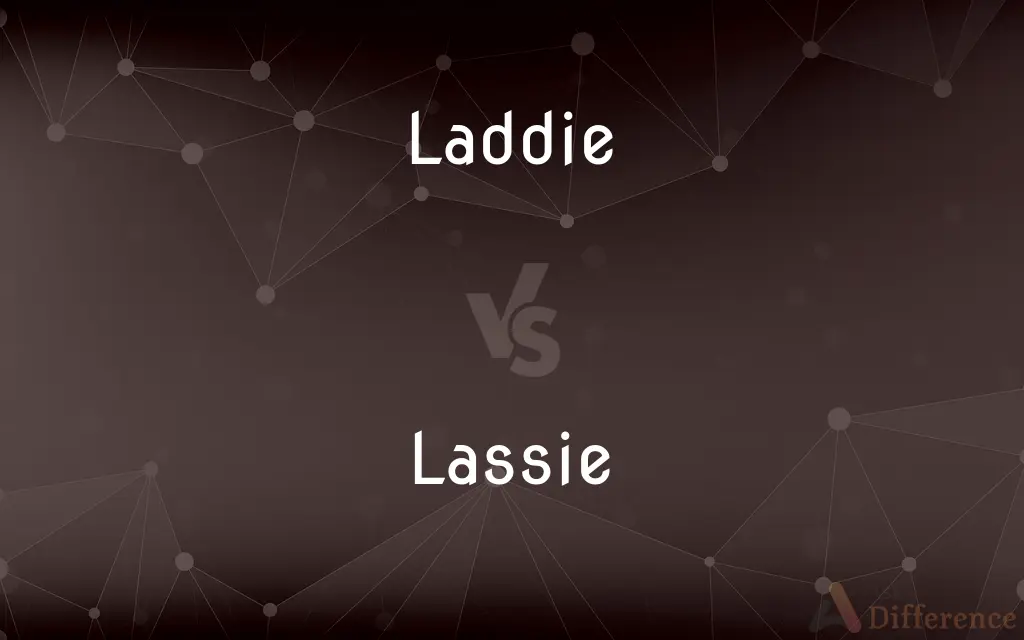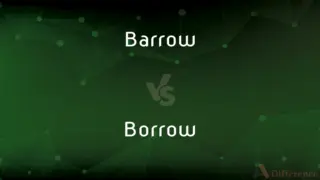Laddie vs. Lassie — What's the Difference?
By Fiza Rafique & Urooj Arif — Updated on April 24, 2024
Laddie refers to a young boy, often used in Scottish English, while lassie denotes a young girl, popularly used in the same regional dialect.

Difference Between Laddie and Lassie
Table of Contents
ADVERTISEMENT
Key Differences
Laddie is a term used primarily in Scottish and Northern English dialects to refer to a young boy or a young man, often conveying a sense of familiarity or affection. On the other hand, lassie is used to describe a young girl or a young woman, similarly used in a familiar and affectionate tone.
Laddie can also imply youthfulness and inexperience, suggesting a boy who is still growing or learning. Whereas, lassie similarly connotes youth and inexperience but specifically in females, often evoking images of innocence and naivety.
Laddie is sometimes used in storytelling and media to depict a character that is adventurous, spirited, and often the protagonist in children's tales. While, lassie is also popular in stories and media, famously associated with the loyal and heroic female collie in the "Lassie" television shows and movies.
Laddie has extended into general usage beyond its regional origins, used affectionately to refer to male youths or sons. On the other hand, lassie too has broadened in usage, often employed affectionately for daughters or young girls in general, beyond its Scottish origins.
Laddie and lassie both play significant roles in cultural contexts, especially within Scottish traditions and folklore, where they are commonly used to address or refer to children and adolescents. While each maintains a specific gender association that reflects traditional views on gender roles.
ADVERTISEMENT
Comparison Chart
Meaning
Young boy or young man
Young girl or young woman
Connotation
Youthfulness, inexperience
Innocence, naivety
Usage in Media
Adventurous, spirited character
Loyal, heroic character
Cultural Association
Scottish, Northern English
Scottish, universally recognized
Common Contexts
Familial, affectionate reference
Familial, affectionate reference
Compare with Definitions
Laddie
A term of endearment for a younger male.
Come here, laddie, and see what I've got for you!
Lassie
A familiar term used for female youths.
The lassies gathered at the village well every morning.
Laddie
A colloquial term for a son.
My laddie just started school this year.
Lassie
A colloquial term for a daughter.
My lassie won her first ballet competition!
Laddie
A young male character in stories.
The brave laddie ventured into the forest to find the lost treasure.
Lassie
A term of endearment for a younger female.
Lassie, can you help me with this?
Laddie
A young boy, especially in Scotland.
The little laddie played by the loch all afternoon.
Lassie
A young girl, especially in Scotland.
The wee lassie was singing a traditional song.
Laddie
A familiar term used for male youths.
The group of laddies was seen playing football in the park.
Lassie
A young female character in stories, notably the dog Lassie.
Lassie saved her owner from danger once again.
Laddie
A boy or young man; a lad.
Lassie
Lassie is a fictional female Rough Collie dog, and is featured in a short story by Eric Knight that was later expanded to a full-length novel called Lassie Come-Home. Knight's portrayal of Lassie bears some features in common with another fictional female collie of the same name, featured in the British writer Elizabeth Gaskell's 1859 short story "The Half Brothers".
Laddie
A small boy.
Lassie
A lass.
Laddie
A lad; a male sweetheart.
Lassie
A young girl, a lass, especially one seen as a sweetheart.
Laddie
A male child (a familiar term of address to a boy)
Lassie
A young girl; a lass.
Lassie
A girl or young woman who is unmarried
Common Curiosities
Do the terms "laddie" and "lassie" have different connotations in different regions?
Yes, in Scotland they carry a traditional and affectionate connotation, whereas in other regions they may be considered more archaic or less commonly understood.
Is "laddie" only used for children?
No, "laddie" can also be affectionately used for young men, often emphasizing a playful or informal tone.
Are there any cultural events where "laddie" and "lassie" are commonly used?
Yes, during Scottish festivals and gatherings, these terms are often used affectionately to address or refer to the younger participants.
Is "lassie" still commonly used today?
While its usage has declined, "lassie" remains a recognized and affectionate term, especially in Scottish context.
Can adults be called "laddie" or "lassie"?
Yes, but usually in a joking or very affectionate manner, reflecting a sense of youthfulness or endearment.
Can "laddie" and "lassie" be used in formal contexts?
Generally, they are reserved for informal contexts due to their affectionate and colloquial nature.
What literary works feature "laddie" and "lassie"?
Both terms appear in traditional Scottish poetry and songs, and "lassie" is notably featured in the "Lassie" series about the heroic collie.
How do "laddie" and "lassie" compare to similar terms in other dialects?
Similar to "lad" and "lass" in English, these terms are more regional and carry a specific cultural affection.
Can "laddie" and "lassie" be used interchangeably with "boy" and "girl"?
While they can refer to boys and girls, their usage often carries additional affection or cultural significance.
What are the origins of "laddie" and "lassie"?
Both terms originate from the Scots language, a variety of the Germanic languages spoken in lowland Scotland and parts of Ulster.
How do "laddie" and "lassie" influence perceptions of Scottish culture?
They contribute to the worldwide image of Scottish friendliness and a strong sense of community and tradition.
What variations of "laddie" and "lassie" exist within Scottish dialects?
Variations are minimal, though pronunciation and usage might slightly differ regionally within Scotland.
Are "laddie" and "lassie" used in modern Scottish media?
These terms appear in contemporary Scottish literature and media, often to evoke a traditional or nostalgic feel.
How have the meanings of "laddie" and "lassie" evolved over time?
Originally more general terms for boys and girls, they have become more affectionately connotative and somewhat nostalgic.
What role do "laddie" and "lassie" play in Scottish folklore?
These terms are commonly used in folk stories and legends, symbolizing the youth and future of the Scottish people.
Share Your Discovery

Previous Comparison
Moderate vs. Mild
Next Comparison
Barrow vs. BorrowAuthor Spotlight
Written by
Fiza RafiqueFiza Rafique is a skilled content writer at AskDifference.com, where she meticulously refines and enhances written pieces. Drawing from her vast editorial expertise, Fiza ensures clarity, accuracy, and precision in every article. Passionate about language, she continually seeks to elevate the quality of content for readers worldwide.
Co-written by
Urooj ArifUrooj is a skilled content writer at Ask Difference, known for her exceptional ability to simplify complex topics into engaging and informative content. With a passion for research and a flair for clear, concise writing, she consistently delivers articles that resonate with our diverse audience.













































